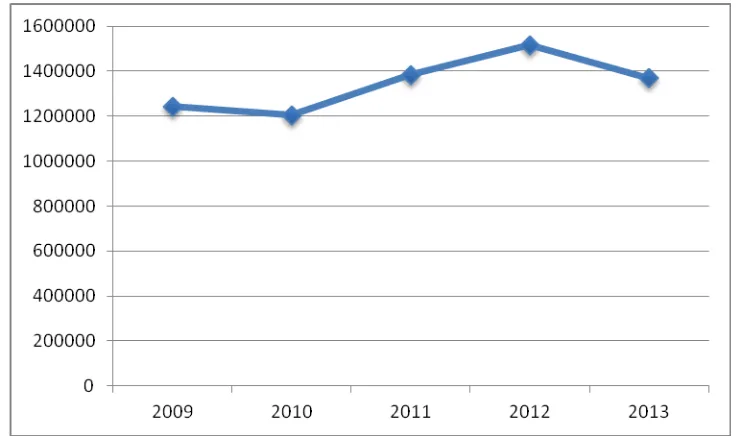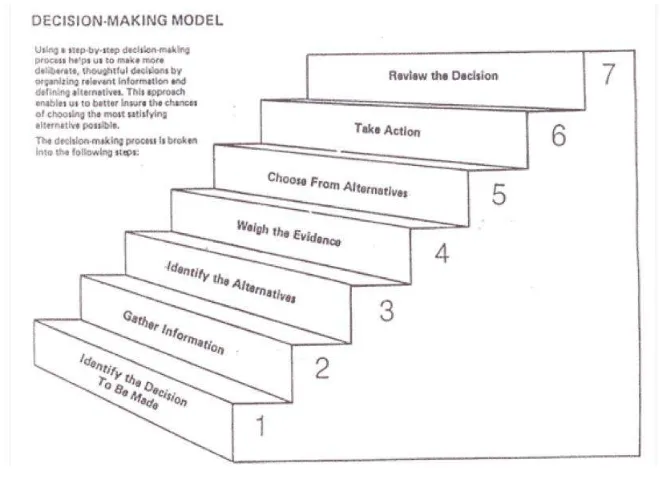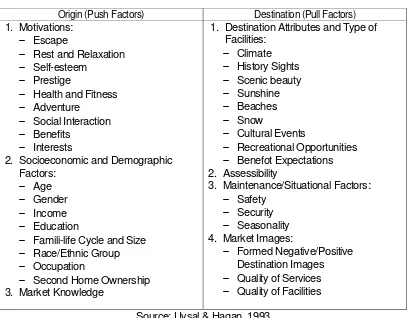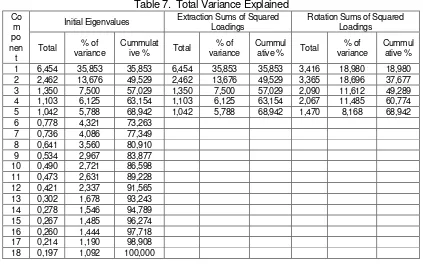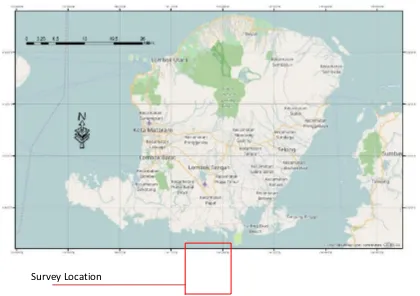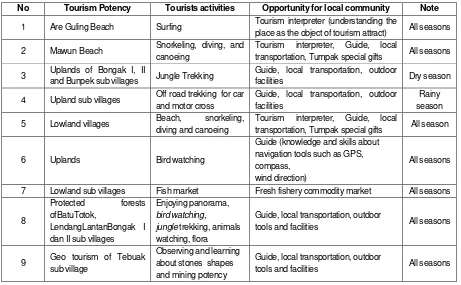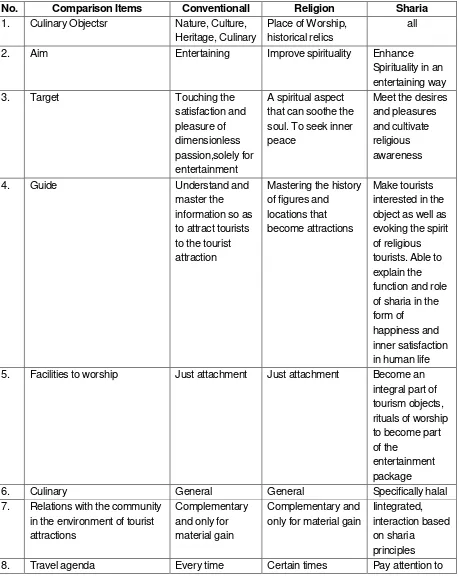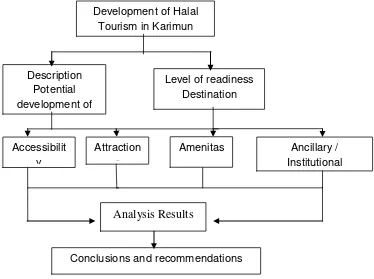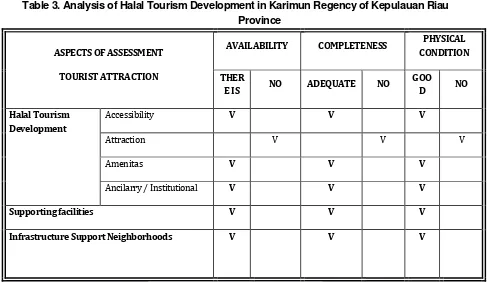The 1
stInternational Conference
On Sustainable Tourism
Theme:
Managing Growth For Sustainable Tourism
Development: Indigenous, Authentic, And
Halal Tourism
Senggigi Lombok Indonesia 2-4 October 2017
Speakers:
Prof. Dr. H. Aman Sya (RI Ministry of Tourism)
Prof. Noel Scott, PhD (Griffith University, Australia)
Budi Faisal, Ph.D (ITB Bandung, Indonesia)
Riyanto Sofyan, MBA (RI Ministry of Tourism)
Fluer Fallon, Ph.D. (Fallon Consultant, Australia)
NPUT
PENERBIT BP2EB
ISBN : 978-602-50301-5-4
Managing Growth For Sustainable Tourism Development:
Indigenous, Authentic, And Halal Tourism
Steering Committee;
Dr. Muaidy Yasin, MS. (Dean of Faculty of Economics and Business, Mataram University) Prof. Noel Scott, Ph.) D (Griffith University, Australia)
Budi Faisal, PhD (ITB)
Organizing Committee:
H. Akhmad Saufi, Ph.D (Chairman) Hermanto, DBA. (Vice Chairman) Lalu Adi Permadi, MM. (Secretary)
Elin Erlina Sasanti, SE., MSc., Ak. (Vice Secretary) Nurabiah, MMSI. (Treasury)
Nina Karina Karim, SE., MSi., Ak. (Vice Treasury)
Editors:
Lalu Adi Permadi, MM.
Elin Erlina Sasanti, SE., MSc., Ak. Nurabiah, MMSI.
Nina Karina Karim, SE., MSi., Ak.
Reviewers:
Prof. Noel Scott, Ph.D (Griffith University, Australia) Budi Faisal, PhD (ITB)
H. Akhmad Saufi, Ph.D (Mataram University)
Cover Design and Layout:
Jamaludin Dedy Iswanto Dewi Komalasari
Publisher:
Lembaga Penerbit BP2EB
Fakultas Ekonomi dan Bisnis Universitas Mataram
Publisher Office Address:
Jl. Majapahit No 62 Mataram 83125
Email : penerbit_bp2ebunram@unram.ac.id,bp2ebunram@gmail.com
First Edition, November 2017
Copyright of this book is protected by the Law. ISBN : 978-602-50301-5-4
The intellectual property of each paper included in these proceedings remains vested in the Authors as listed on the papers.
FOREWORD
It is with great thank to Allah Almighty who has given us the opportunity to host this
International Conference on
“Managin
g Growth for Sustainable Tourism Development:
Indigenous, Authentic, and Halal Tourism”
2017 in Senggigi Lombok and completed this
proceeding to fulfill academic result of the conference. This proceeding covers all
material that had been prepared by the keynote speakers, invited speakers and
authors. This proceeding hopefully will continue by entering one of international
journals that also had been offered by the committee.
We realize that in the completion of this conference there are so many contributions
from other parties. We would like to give grateful thanks to all those who have actively
supported this International Conference since the preparation stage to the completion
of this proceeding.
Firstly, we would like to thank the Ministry of Tourism Dr. Arief Yahya which has
supported the Committee to host this international event. The ministry’s concern on
tourism development in Lombok and Sumbawa Islands is really meaningful and has
motivated the Committee to host this Conference.
We would like to thank the Governor and Vice Governor of the Province of Nusa
Tenggara Barat, the Regent of Lombok Barat and other government officials who have
given tremendous support to the success of the Conference programs. We certainly
hope that this event can bring new ideas and insights into developing a sustainable
tourism in the Province of Nusa Tenggara Barat.
In this occasion, also we would like to thank Prof. Noel Scott of Griffith Institute for
Tourism at Griffith University Australia, Budi Faisal, Ph.D of Center of Tourism at
Bandung Institute of Technology and Mr. Ispan Junaidi, the Chief of Lombok Barat
Regency Tourism Agency, who have honored us through their continuous support, care
and supervision. Managing an international event such as this is a demanding task,
however, made easy by the share of laughter and joy among the Committee members
and Lombok Barat Regency Tourism Agency staff.
Tourism Agency of Lombok Barat, Uniti College - Malaysia, Ummul Qura University
–
Kingdom of Saudi Arabia and Sejong University
–
Republic of Korea. It has been great
pleasure and honor for us to work with all of the partners hand in hand during the
Conference preparation. We hope that this partnership will not be the last.
Finally, we realize that this conference and its proceeding are not perfect, so we hope
critics and suggestions from all stakeholders. Thank you.
H. Akhmad Saufi, M.Bus., Ph.D
Chairman
Ph.D. of International Tourism
ISBN : 978-602-50301-5-4
H
OSTS
F
ACULTY OFE
CONOMICS ANDB
USINESS–
U
NIVERSITY OFM
ATARAM,
I
NDONESIAG
RIFFITHU
NIVERSITY,
A
USTRALIAG
OVERNMENT OF WEST LOMBOKBANDUNG INSTITUE OF TECHNOLOGY
(ITB)
C
O
-H
OSTS
W
ESTN
USAT
ENGGARAP
ROVINCEG
OVERNMENTU
MMULQ
UROU
NIVERSITYKSA
U
NITIC
OLLEGEM
ALAYSIAS
EJONGU
NIVERSITY,
R
EPUBLIC OFK
OREAO
RGANIZING
C
OMMITTEE
Patrons 1. Prof. H. Sunarpi, Ph.D
(Rector of University of Mataram) 2. Prof. Suwardji, Ph.D
(Vice Rector of University of Mataram) Care-taker Dr. Muady Yasin, MS.
(Dean of Faculty of Economics and Business) Academic directors 1. Prof. Drs. H. Thatok Asmony,MBA, DBA
2. Drs. Budi Santoso, M.Com, Ph.D. 3. Agusdin, SE., MBA, DBA. 4. Sulhaini, SE., M.Sc., Ph.D Sponsorship directors 1. Dr. Prayitno Basuki, MA.
2. Dr. H. Busaini, M.Si. 3. Dr. H. Sahri, M.Si.
Chairman H. Akhmad Saufi, SE., MBus., Ph.D
Co-chair Prof. Noel Scot
Vice-chairman Drs. Hermanto, MBA., DBA Secretary Lalu Adi Permadi, SE., MM. Vice Secetary Elin Erlina Sasanti, SE., MSc., Ak.
Treasurer Nurabiah, MMSI
Vice Treasure Nina Karina Karim, MSi., Ak Event and Field Trip 1. Drs. Rahman Dayani, M.Si.
3. Emilia Susanti, SE., MM. 4. Dr. Baiq Handayani R. Food and Baverages 1. Dra. Ida Ayu Putri Suprapti, MA
2. Dr. Siti Nurmayanti 3. Dra. Baiq Ismiwati, MSi Secretarial 1. M. Gufron, S.Sos.
FOREWORD ... i
CONTENTS ... v
INVITED SPEAKERS ... vii
Developing Halal tourism in Lombok
Noel Scott
Professor, Deputy Director
Griffith University Australia.
noel.scott@griffith.edu.au
ABSTRACT
It is estimated that in 2010 there were 1.6 billion Muslims, representing 23.2% of an estimated population of 6.9 billion (or one out of every five person in the world). More than 61% of Muslims live in the Asia-Pacific region and Indonesia (209 million) has the largest Muslim population. The
world’s Muslim population is projected to grow by about 35% between 2010 and 2030 to 2.2
billion. These people’s are also experiencing rapid economic growth. Clearly, demand for goods
and services meeting the needs of Muslims will grow.However, these goods and services have
distinctive characteristics. The holy Qur’an provides guidance in all aspects of life, and
influences the direction of tourism choices that both individuals and governments are making about alternative forms of its development and practice. Islam shapes the choice of a destination for travel and what is done at the destination. The benefits of travel are many: the freshness it brings to the heart, the delight of beholding new cities, the meeting of unknown friends, the learning of high manners.
Many tourism destinations in non-Muslim countries are providing food, daily prayer facilities,
hotels and activities that are shari’a compliant. To accommodate increasing numbers of Muslim
tourists, especially from the Middle East, many destination management organizations or hotel properties have added relevant information to their websites, such as prayer times and locations where mosques and halal food can be found. Tourism operators have also provided their staff with training about cross-cultural communication and to inform them how to accommodate or treat Muslim tourists with respect. However, in some countries, Muslims may feel constraints placed upon them in a host country. The growing significance of such intra-Muslim traffic has led some countries such as Malaysia to focus on attracting Muslims and to develop their tourism
industry to match the needs of these travellers – called halal tourism.
The concept ofhalal tourism implies more local and regional social context to travel whereby Muslims can learn about other communities and share their faith. Such tourism includes travel to Islamic historical religious and cultural sites and countries. It requires the tourism offering (food, accommodation, services and attractions) to be, and seen to be, halal. Such travel is proposed as an alternative to a ‘Western’ hedonic conceptualization of tourism. Lombok has a
mainly Muslim population and is known as the “Island of a 1000 mosques”. Development of
ISBN : 978-602-50301-5-4
the region. But tourism is also a business. Development of halal tourism requires consideration of development of promotional material, use of marketing channels such as social media to reach target markets, money to build hotels and attractions, training of a labour force, and so on. This paper will explore some of these requirements for developing halal tourism in Lombok.
Tourism is the world
‟
s largest “industry”
Seats per capita vs GDP per capita
Around 10% of GDP.
1.2 billion travellers in 2016. Growth due to
Increases in personal income expanding middle class demand for services increases Increases in business
Increasing population Increasing LCC competition
Source: CAPA - Centre for Aviation, OAG (seat data for week of 9-Jun-2014),
Griffith Institute for Tourism | World-leading tourism researchInternational Monetary Fund
Growth in Asia and the Pacific
Tourism managers need to anticipate this rapid tourism growth and possible negative impacts and pressures on the natural environment, built infrastructure, society and the economy as a whole.
ISBN : 978-602-50301-5-4
Indonesian domestic travel increasing
Growth due to
Increases in personal income
expanding middle class
demand for services increases
Increases in business
Increasing population Increasing LCC competition
Estimate of trips growth 2013-2020
Griffith Institute for Tourism | World-leading tourism research
Why do people travel?
The UNWTO definition
"Tourism comprises the activities of
persons traveling to and staying in
places
outside their usual
environment
for not more than one
consecutive year for leisure,
business and other purposes.
Griffith Institute for Tourism | World-leading tourism research
Outside the normal environment means
What is your dream holiday?
Exotic
Comfortable
Relaxing
Togetherness
Romantic
Adventure
Different from everyday life
Griffith Institute for Tourism | World-leading tourism research
Lombok needs to be
authentic!
Griffith Institute for Tourism | World-leading tourism research
ISBN : 978-602-50301-5-4
How to differentiate Lombok?
Griffith Institute for Tourism | World-leading tourism research
Lombok
2016 Halal Awards
Lombok World's Best Honeymoon
Destination Halal and Halal
World's Best Tourism Destination.
World's Best Family Friendly Hotel
won Sofyan Betawi Hotel, Jakarta.
Griffith Institute for Tourism | World-leading tourism research
Who should Indonesia target?
Current tourism
225 million Indonesian visitors
versus
10 million international visitors
Griffith Institute for Tourism | World-leading tourism research
Percent of world Muslim pop.
Indonesia (12.9%)
Pakistan (11.1%) India (10.3%) Bangladesh (9.3%) Iran (4.7%) Saudi Arabia (2.0%) Malaysia (1.1%)
United Arab Emirates (0.2%) United Kingdom (0.1%) United States of America (0.2%)
Pew Research Institute (2009)
Muslim Populations of the World (1.6Bn est)
Percent of world Muslim population
International demand growing
Indonesia (12.9%)Pakistan (11.1%) India (10.3%) Bangladesh (9.3%) Iran (4.7%) Saudi Arabia (2.0%) Malaysia (1.1%)
United Arab Emirates (0.2%) United Kingdom (0.1%) United States of America (0.2%)
Pew Research Institute (2009)
Griffith Institute for Tourism | World-leading tourism research
ISBN : 978-602-50301-5-4
Islamic Travel Expenditure by country
Griffith Institute for Tourism | World-leading tourism research
Competitors
International destinations
Indonesian destinations
Malaysia
Aceh
Brunei
Griffith Institute for Tourism | World-leading tourism research
Indonesian tourists are a logical market for
Lombok - its authentic.
But
Is this the only market?
What products and services?
How do we gain agreement from
all stakeholders?
What does Halal tourism mean?
How do we manage tourism?
Griffith Institute for Tourism | World-leading tourism research
Branding
Griffith Institute for Tourism | World-leading tourism research
Developing a strategy
ISBN : 978-602-50301-5-4
This is a branding issue?
Brand create cohesion
CONSUMER
Marketing
FNQ
Lots of previous examples
of
Far North Queensland
ATC QTTC FNQPB Industry
BRAND FNQ
Airlines Wholesale Retail
Far North Queensland Promotion Bureau Queensland Travel and Tourist Corporation
Australian Tourist Commission
Logo, tag-
line, Tone, Style,
typestyle Feel, Colour
Personality Image
& Benefits Associations
Griffith Institute for Tourism | World-leading tourism research
Destination branding
November 1996 Final Report
Purpose of branding
To differentiate the destination
from competitors
To increase awareness and
recognition
To create a positive image
To give a strong and
compelling brand identity
A tourism destination brand is ..
… a PROMISE
It establishes the kind of
experience that the visitor can
expect from the destination.
Griffith Institute for Tourism | World-leading tourism research
Brand values of Australia
Queensland is not about „lifestyle
‟
-
Queensland is
a way of life
Griffith Institute for Tourism | World-leading tourism research
ISBN : 978-602-50301-5-4
Halal tourism
Griffith Institute for Tourism | World-leading tourism research
Halal tourism
The concept of halal tourism provides comfort and security for Muslim travelers.
Islamic tourism.
Any activity, event and experience undertaken in a state of travel that is
in accordance with Islam (Islamic Tourism Centre - Malaysia 2015)
Halal tourism
Offering tour packages and destinations that are particularly designed
to cater for Muslim considerations and address Muslim needs
Similar to Muslim-friendly tourism
Halal considerations
Places of worship is provided to guests
Availability of halal food.
Griffith Institute for Tourism | World-leading tourism research
Halal considerations
Art should not depict human form.
Beds and toilet positioned so as not to face the
Griffith Institute for Tourism | World-leading tourism research
ISBN : 978-602-50301-5-4
Halal tourism
Basic needs
Halal food and food
accreditation.
Convenient prayer facilities.
Information about halal services.
Further needs
Appropriate segregation of
males and females.
Dealing with alcohol?
Griffith Institute for Tourism | World-leading tourism research
Halal tourism in
Australia
Halal products and services
Griffith Institute for Tourism | World-leading tourism research
Halal tourism in Australia
Is a market opportunity that government
supports.
Government provides information and
training in meeting customer needs.
Government encourages operators meet
basic needs.
Individual businesses decide what to offer.
Griffith Institute for Tourism | World-leading tourism research
ISBN : 978-602-50301-5-4
To develop ANY
tourism Lombok
needs to
Griffith Institute for Tourism | World-leading tourism research
Clean up garbage.
Tourists do not want garbage on the
street.
Rubbish will pollute the environment.
Develop good sewerage systems.
Griffith Institute for Tourism | World-leading tourism research
Manage growth impacts
Who is included?
Context
Task
Decision
making processes
Rules, regulations
Managing tourism destination sustainability is a new task that requires changes in governance arrangements.
Griffith Institute for Tourism | World-leading tourism research
Develop trained staff
Language skills
Overseas experience.
Government officer training.
Local community business training.
Australia Awards Indonesia Short CourseGriffith Institute for Tourism | World-leading tourism research
ISBN : 978-602-50301-5-4
Australia Awards Indonesia
30 awardees of Sustainable Tourism for Regional Growth 2017 Short Term Awar from 12 provinces are received by Austr Con-Gen in Makassar
Griffith Institute for Tourism | World-leading tourism research
Australia Awards Indonesia
Griffith Institute for Tourism | World-leading tourism research
Design new
experiences
Griffith Institute for Tourism | World-leading tourism research
Create new experiences:
Uluru “Field of Lights” and
outdoor dining
Experiences
Sightseeing
ISBN : 978-602-50301-5-4
Visitor involvement
Griffith Institute for Tourism | World-leading tourism research
Develop engaging
experiences
Breakfast as entertainment - Undara Lodge
Customer
journey
The problem
Cognitive psychology
Theories and Concepts
Methods
ISBN : 978-602-50301-5-4
Longjin Brook Cultural
Attraction - a tour as a story
Designed by a film maker.
Tour tells story of local
people.
First Scene: a woman on a
boat sing goodbye to her
husband.
Longjin Brook - Scene 2
Longjin Brook - Scene 3
Traditional music of the region.
Longjin Brook - Scene 4
The marriage ceremony
I was picked to get married
This created a memory I
have never forgotten.
This is a “co
-
created”
emotional experience.
ISBN : 978-602-50301-5-4
Experiences should
be culturally
appropriate
Griffith Institute for Tourism | World-leading tourism research
The problem
Over the past 70 years, Australia has sold its tourism products and services firstly to Australians holidaying in Australia and then to Western (mostly English-speaking) international visitors. We had some success with Japan in the late 1980s and more recently with Asian countries such as South Korea, Taiwan, Hong Kong and Singapore.
Mostly we sold visitors from these countries sightseeing to icons such as Great Barrier Reef, Uluru, and the Sydney Opera House. However, we got very little repeat business. Visitors were happy to see the sights but did not engage significantly with our culture and the everyday life of Australians.
Selling Beach Experiences
ures
Australians
like swimming in waves.
Chinese
like to visit the beach on Gold Coast
but do not swim.
Question: How do we
change
the Australian
beach experience for Chinese people.
Answer: Design a new beach experience on
beach culture and beach food.
Griffith Institute for Tourism | World-leading tourism research | © Gardiner, 2016.
Adapting to Chinese tastes
There are some really good examples of entrepreneurs adapting to Chinese tastes and providing valuable experiences. An example is “catch
a crab tours” which involve no major physical activity
but do provide an opportunity to each local food that is fresh. Crabs are a common meal in China but of course there are issues about their provenance.
Catching a crab in the “wild” and then cooking and
eating it can provide a truly memorable experience for a Chinese visitor.
http://www.catchacrab.com.au/virtual-tour/p/123
ISBN : 978-602-50301-5-4
Last words
Griffith Institute for Tourism | World-leading tourism research
Other issues
Cost of certification expensive
Competition from other
destinations is increasing.
Dress code should allow hijab
(Some hotels and restaurants do
not allow staff to wear hijab).
Cleanliness of destination
THE ESSENCE OF
SUSTAINABILITY
THINKING
DR FLEUR FALLON
ASSOCIATE OF SUN YAT-SEN UNIVERSITY, SCHOOL OF TOURISM MANAGEMENT OCTOBER 2017PILLARS OF SUSTAINABILITY
ENVIRONMENT CLIMATE CHANGE
ECONOMY
COMMUNITY - CONVERSATIONS
ISBN : 978-602-50301-5-4
TOURISM FOR SUSTAINABLE
DEVELOPMENT
QUALITY OF LIFE
SUSTAINABILITY FOR WHOM?
INCLUSIVE, POOREST OF THE POOR
EQUITY, ECONOMIC GAINS
ENVIRONMENT PROTECTION
GOVERNMENT-INDUSTRY-COMMUNITY PARTNERSHIPS
SHIFTS IN SCALE; TIME
LAGS
HEALTH
HOUSING, WATER, SANITATION EDUCATION
STUDENTS AND HOUSING, SUMBA 2017 CULTURE, POVERTY, CONTEMPORARY
SITUATION…OPPORTUNITY TO COMPETE
APPROACHES TO CONFLICT
TOURISM AND HOSPITALITY CONTEXT COMPETITION; CONFLICT
WINNER TAKES ALL; WIN-LOSE PROTECT AND ENHANCE ENVIRONMENT CARRYING CAPACITY CONTROL EVERYONE GAINS
COLLABORATIVE
LEADERSHIP
EVERYONE IS A LEADER
LEADERSHIP FROM BEHIND
‘SERVANT’LEADERSHIP
GRASS-ROOTS
ENCOURAGE LEADERSHIP,
STRAIGHT THINKING, TALKING AT ALL LEVELS
TOURISM CONFLICT: COMPETITION x COMMUNITY = ECONOMY CONTEXT + ENVIRONMENT
ISBN : 978-602-50301-5-4 CONNECTED
CONVERSATIONS
EMOTIONAL &
ECOLOGICAL
INTELLIGENCE
VALUES
DEVELOPING PERSONAL LEADERSHIP SKILLS
INTEGRATING SCIENCE AND ART OF
SUSTAINABILITY
INTANGIBLE CULTURAL HERITAGE
HANDED DOWN BETWEEN GENERATIONS
IMPLICIT AND FORMAL KNOWLEDGE
MUST COMBINE SCIENCE AND ART -
THE ART OF LEARNING AND TEACHING
ART OF CONVERSATIONAL
COMMUNICATIONS
CONNECTEDNESS
BUILD RELATIONSHIPS - EAT TOGETHER
SHARE AND ESTABLISH GROUP VALUES AND CONCERNS
DEVELOP GROUP PURPOSE WITH DISCIPLINE
FOUR CONVERSATION MOVES:
MOVE/ OPPOSE/ INITIATE QUESTION
FOLLOW/ OBSERVE/
CLARIFY REFLECT
SUMMARY: SCIENCE AND ART
OF LEADING CONVERSATIONS
SELF-AWARENESS
EMOTIONAL & ECOLOGICAL INTELLIGENCE CLARITY OF OWN VALUES
PURPOSEFUL EASE WITH OTHERS
OPENNESS; CONNECTEDNESS
WILLING TO LEARN FROM THE SITUATION
THE
RIGHT
NICHE;
THE
RIGHT
THING;
THE
RIGHT
TIME…
SOUNDS EASY, COMMON SENSE BUT DIFFICULT IN PRACTICE NEED TO OVERCOME EGO
UNLEARN LEARNING ABOUT VERTICAL HIERARCHIES, TOP-DOWN COMMUNICATION
A LONG WAY TO GO
BUT WE CAN BEGIN WITH THE FIRST STEPS TO CONSIDER SERIOUSLY, TODAY. THANK YOU AND HAVE A WONDERFUL
CONFERENCE! FLEUR
LIST OF PRESENTER FULL PAPERS
Andi Fariana, Euis Puspitadewi -The Application of Islamic Law Values And The Empowerment of Local Community In The Setup of Tourism Area For The Sake of The Halal Tourism Sustainability In Lombok ... 1
Anik Nuryani, Handayani Rahayuningsih- Phenomenology Study on Food Creations Which Use City’s Names As Souvenirs ... 10
Eska Nia Sarinastiti - Strengthening e-Branding Strategy of Shariah Hotel in Indonesian Hotel Industry . 20
Farida Komalasari and Muhammad Zharfan - The Determinants of Travel Decision to Monas, Jakarta ... 34
Femiana Gapsari, Khairul Anam, Suteja, Widya Wijayanti--The Potency Mapping of Tumpak as a Tourist Village in Central Lombok ... 50
I Wayan Thariqy Kawakibi Pristiwasa -The Development of Halal Tourism in Karimun, Riau Province ... 58
Mahrup, Bambang Dipokusumo , IGM. Kusnartha and L. M. Furkan - Revitalization Of An Indigenous Farming Practice For Sustainable Tourism Development In Lombok ... 70
Marsdenia, Umar Abdurrohim- Development of Halal Tourism In Maintaining Economic Growth: An Opportunity Of Most Intsragammable Panenjoan Hills View, Purwakarta, West Java Province ... 81
Meizar Rusli and Teguh Pujiwioto - Halal Tourism or Muslim-Friendly Tourism? Bogor City Tourism Management in improving the Quality and Quantity Visit ... 89
Dr Ndivhuwo Tshipala, Dr Willem JL Coetzee, Prof Marius Potgieter - Sustainable Indicators for
Adventure Tourism Destinations: A Case of Waterval Boven ... 99
Putri Mahanani and Gancar Candra Premananto - The Effect of CSR on Consumer Response in Service and Product Failure ... 112
Amaranti Sih Utami - Landscape Planning of Tetebatu Ecotourism Area, Mount Rinjani National Park . 124
Serli Wijaya, Stanislaus Kenny Notoprasetio, Yoel Jemi Echarystio, and Yoel Wibowo - Restaurant
Management’s Perspective on Halal Certification: An Exploratory Study in Surabaya ... 138 Upik Dyah Eka Noviyanti - Development Strategies of Kampung Lawas Maspati as The New Tourist Destination in Surabaya ... 148
iii
and Brand Trust on Consumers’ Buying Interest of Sharie Radjanya Durian Pancake in Mataram ... 173 Handayani Rahayuningsih, Anik Nuryani - The Role of Public Figures in Food Branding: A Case Study .. 188
Nanik Eprianti, Popon Srisusilawati, Panji Adam - The Role of DPS in Providing Food Product Supervision on Sharia Tourism ... 199
Panji Adam, Maman Surahman, Yandi Maryandi - Halal Label Urgention in Food Products in Sharia Tourism Business as Consumer Protection in Islam Law ... 205
Yayat Rahmat Hidayat, Sandy Rizki Febriadi, Intan Manggala Wijayanti - Implementation of Maqashid Sharia in The Management of Halal Tourism... 212
Dr. Dian Masita Dewi, SE.,MM - Can Corporate Social Responsibility Effects To The Tourism Environment By Traditional Food Benefits? ... 222
Sulistyo Utomo, Noel Scott, Xin Jin- Indonesian Hajj Satisfaction Dimensions ... 225
Titus Indrajaya, Martha Fani Cahyandito - Creative Industry Development Strategy As A Driver For Tourist Destination In Banten Province ... 238
Sucipto Sucipto, CandraK. Wijaya, Mas’ud Effendi, Aryo Pinandito, Herman Tolle - Acceptance of Halal Culinary Tracking (HCT) Application by Food Small Medium Enterprises (SMEs) to Support Halal Tourism ... 250
Sri Murni Rahmawati, Sri Wahyu Agustiningsih and Sarah Rum Handayani - Development of Edu-Tourism Village That Eco-Friendly and Community-Based As New Tourism Destination in Lombok ... 264
Imam Santoso and Afita Ismawati - Consumer Awareness and Purchase Decision of Halal Food in Supporting Halal Tourism Destination: Role of Knowledge, Religiosity, Food Safety and Marketing Mix
C. G. Perdani, R. Angelina , Sucipto - Evaluation of Halal Assurance System in Hotel Restaurant with Shariah Concept To Support Halal Tourism (Case Study at Hotel Fariz Syariah Malang) ... 285
D.T.Setiyawan, Sucipto, R. Wicaksono - Estimation of the Prerequisite, Certification and Implementation
Cost of Halal Assurance System In Culinary Business (Case Study At UB’s Library Canteen) ... 296 Lalu M. Furkan, Handry Sudiartha A., Luluk Fadliyanti, Agusdin - Exploring Open Innovation in the Lombok Tourism Industrial Cluster ... 303
Vidya Yanti Utami - Comparing Methodological Implications of the SWOT Analysis and Scenario Planning Methods in Formulating Strategies of Halal Tourism Development ... 329
Prof. Dr. Rahmawati, M.Si., Ak, C.A - Solo Creative City Network: Development of Household Waste Creative Industry as Market Engine Of Tourism Industry ... 344
Awaludin, Dwi Ratna Kamala Sari and Syarifah Isna Mariva - Tourism Promotion Authority Board of District North Lombok ... 359
Sri Widyastuti, Handry Sudiartha Athar, Sudarmin P., Fatima T - How the Halal Tourism Industry can be encouraging The Nations Competitiveness (A Literature Reviews) ... 367
Irawan1, Alexandra Hukom, Mansyur Afifi, Emelia - Opportunity and Challenge of Development of Ecotourism in the National Park Sebangau Central Kalimantan towards Sustainable Development ... 379
Dedy Iswanto, Lalu Adi Permadi, Muhtar Ahmad, Irwan - An Analysis on Customers’ Satisfaction of Manual - based Ticket Service at Cooperative “Karya Bahari”, Bangsal, North Lombok ... 392 Lady Faerrosa Josman - Halal Tourism in Lombok Island: Implementation, Non-Muslim Perception on
the Concept, and Muslim Tourists’ Preference ... 405 Nana Trianasari - Empowering Local Community through surf life saving initiatives for the beach visitors in Sangsit Village ... 412
Farid Said, Hamsu Hanafi and Rudi Salam - Halal Tourism Marketing Strategy in Indonesia ... 417
Nana Trianasari .. - Hotel Educational Program in the eyes of Millennial Students: An exploratory study at Undiksha ... 423
Endah Saptutyningsih dan Lilies Setiartiti - Local Wisdom for Sustainable Development of Islamic
Tourism: a Case study of Kotagede Yogyakarta, Indonesia ... 428
Lalu Adi Permadi, Harmi Widiana, Thatok Asmony, Hilmiati-Identification of Strengths, Weaknesses, Opportunities and Threats in the Development of Jeruk Manis as Tourism Village in East Lombok
ISBN : 978-602-50301-5-4
The Application of Islamic Law Values and the
Empowerment of Local Community In The Setup of
Tourism Area For The Sake of The Halal Tourism
Sustainability In Lombok
Andi Fariana1, Euis Puspitadewi2
1 ABFII (Asian Banking, Finance and Informatics Institute) Perbanas, Jakarta
2 UPI (Universitas Persada Indonesia) YAI, Jakarta
ABSTRACT
Halal tourism must be in harmony with the teachings of Islam that has rahmatan lil alamin principle and also aligned with its three dimensions which is a unity, aqidah, syariah, and akhlak, in order to reach prosperity (Al Falah). Natural resource and culture richness of Lombok that is very closely related with Islamic teachings (as the living law) is a potential halal tourism opportunity that is currently being developed and as well as a means for reaching economic welfare, as well as a means of worship to the god. This study explores the tourist destination in Lombok through the concept of halal tourism area arrangement in order to support the prosperity of the local community. Therefore, the application of the concept of the arrangement of areas that meet the values of Islamic teachings through the empowerment of Lombok Muslim society became the key in this study. Through descriptive qualitative study, several strategies for structuring and empowering the community through continuous training and provision of education and training institutions are deemed very important for the realization of the sustainability of halal natural tourism.
Keywords: Islamic Law, Halal Tourism, Community Empowerment, Education and Training
1. INTRODUCTION
Islamic law is not the same as Fiqh. Islamic law is the Islamic values that have been adopted or transformed into positive law, and now there are quite a lot and concerning broadest muamalah issues. For example viewed from the existence of the Law on waqf, Law of Religious Court, Sharia Banking Law and so forth even up to the level of Local Regulation (Perda).
Tourism as one aspect in muamalah life certainly not escape the touch and color of values derived from
the living law (in this case Islamic Law). It becomes a necessity when a halal (kosher) tourism is
developed since it is one of the manifestations of the development of Islamic values in all sides of life. This is due to the predominantly Muslim population of Indonesia and the increasing trend of religious
1
ABFII (Asian Banking, Finance and Informatics Institute) Perbanas, Jakarta
2
consciousness in recent decades (ie evident from the development of Islamic economics including sharia banking).
The development of Islamic economics and especially sharia banking which is the underlying of all
economic activities is like a locomotive which attracts other sharia economic activities such as in education, non-banking finance, including tourism industry. If you talk tourism then the problems that arise will involve a very wide dimension, from hotel, travel to tourism object issues.
Tourism is an important aspect that supports the tourism industry, and in the context of the development of halal tourism, the existing attractions need to be arranged in such a way with an Islamic color without damaging the creative work of Allah SWT.
2. DISCUSSION
2.1. Islamic law as the living law and its strategic role in the development of Halal tourism
Positive Law is a unified legal system that is influenced by Customary Law, Islamic Law and Western
Law as The Living Law.Talking about Halal Tourism means talking about tourism and Islamic Law. It is
realized that tourism is a part of human activity which in Islam including into the activity of muamalah whose argument is "all is allowed except for things that are forbidden".
With the deep understanding of Islamic law, there is a difference of definition between sharia and fiqh.
Syekh Mahmout Syaltout3 says sharia as the rules created by God so that men hold to sharia in their
relationship with their God, their fellow Muslim, their fellow human beings as well as his relationship with the whole nature and relationship in their life, while fiqh is defined as derivatives of sharia which are more applicable.
In Indonesia, the development of fiqh is very dynamic. The influence of culture causes the development of fiqh becomes so easy and without turmoil, it can be said that a fiqh Nusantara (Archipelago) is loaded
with nuances tawasuth (middle way), tasamuh (tolerant) and tawazun (balance). If traced the
development of a fiqh Nusantara rooted in the school of Shafi'i because in general, da'i (Isamic preacher) who came to Indonesia such as the generation of wali songo and previous generation had
Syafi'i madhhab (school).4 However, the question of the experts on Islamization in Indonesia has not
been answered explicitly, but Azyumardi Azra's opinion5 is noteworthy, that the process of Islamization
in Indonesia must be viewed from a global and local perspective as well. From a global perspective, the Islamization in Indonesia should be understood as an integral part of the dynamics and changes that occur in the Islamic world globally. Global dynamics will certainly affect the dynamics and traditions of local Islam in Indonesia.
The development of fiqh in Indonesia in addition to the conducive cultural factors, the da'i who mostly follows Syafi'i madhhab where the credo preached is very adaptive then no less important is the fact that
3 Mahmout Syaltout, Al Islamu Akidah Wa Syariah, Daarul Qalam, Print III, 1966, pp. 10 4 Nashib Nashrullah in
Jaringan intelektual kaum santri (The intellectual network of students in Islamic boarding schools), Republika, 9 November 2014, p. 16
5
ISBN : 978-602-50301-5-4
legal material inputs from anywhere, provided that it does not conflict with the values of Pancasila and the 1945 Constitution. This happens almost all over the country. Even according to Ismail Sunny, this is where the important role of Islamic political law of Indonesia is the process of accepting the Islamic law as a source of law by the State or legal policy that will or has been nationally implemented by the Government of Indonesia. The politics of Islamic law includes the development and renewal of the law on Islamic legal materials to suit the needs of the people. It includes therein having an understanding of the applicable implementation of Islamic law, the enforcement of the functions of institutions, and the
fostering of Islamic law enforcement.7
If further exploring the implementation of Islamic Law in Indonesia, then there are five theories that can be used in detail:
1. The theory of the credo,
2.The theory of Receptio in complex,
3. The theory of Receptie,
4. The theory of Receptie Exit
5. The theory of Receptie A Contrario.
The birth of these theories shows that the existence of Islamic law in Indonesian society is a necessity and grows along with the growing and the developing theories and the formation of National legal system.
If it is linked between the existence of Islamic Law with tourism activity then it is necessary to be studied
first how Islam view about tourism activity. The term tourism in Islam is Al Rihlah and Al Safar means as
a travel activity from one place to another with a specific purpose.8 This understanding is in accordance
with Law Number 10 of 2009 which states that the tour is a travel activity and as part of the activity carried out voluntarily and is temporary to enjoy the tourist object and attraction. In addition, it is also mentioned that tourism is anything to do relating to tourism, including the mastery of tourist objects and attractions and the efforts associated with this sector. Therefore, the Law on Tourism is closely related to the Law on Environmental Management and Protection, namely Law No. 32 of 2009.
The guide of tourism within Islam can be seen in QS Al Ankabut verses 19-20 which asserts that humans need to travel to conduct research on various historical relics and human culture in order to be born of awareness about the essence of selfhood of humans as mortal creatures. Similarly, it contained in QS Yusuf verse 109 affirms to conduct searches in various countries as a sign that humans need to know the culture of society over other world. Another verses in the Qur'an that can be used as a guide in this case is QS Ar Rum verses 41-42 stating that destruction occurs on earth due to carelessness and human actions and then humans thereafter are asked to watch and take as lessons. Several other verses of the Qur'an in mentioning the terms safar are found in many verses such as Al Baqarah, An Nisa, Al Maidah while the terms Rihlah is contained in QS 106 which implies the habit of quraisy tribe to carry out the business travel in winter to Yemen and in summer to Sham. While Rasulullah SAW advised his people to conduct the travel (spiritual tourism) to the three Mosques, they are Al Masjid Al Haram, Al Masjid Al Rasul (Prophet)/Nabawi and Al Masjid Al Aqsa.
6 Ija Suntana,
Politik Hukum Islam (Politics of Islamic Law), Pustaka Setia, Bandung, 2014, p. 15
7
Ibid, p. 16
8
4
Islam encourages its people to travel with various purposes. However, in general it aims to gain teaching and kindness and provides awareness to humans to think and take lessons from travel activities undertaken. A history records the first Muslim to traveled in medieval times was Ibn Batuta (a young man
from Morocco) whose travel record was entitled The First Traveler of Moslem. 9
Tourism activities with various terms are accommodated even recommended in Islamic teachings. But it becomes a problem when the developed tourism industry does not have the expected impact or objectives due to various factors. One of the factors that can support the achievement of the expected goal is a tourism object that becomes a tourist destination that is appropriate in accordance with the terms and objectives of the Sharia. This is where the importance of the development of halal tourism.
2.2. Implementation of Halal Concept and Community Based Tourism (HCBT) on the Arrangement of Tourism Area in order to support the Halal Tourism Sustainability in Lombok
2.2.1 Physical and Society Potential in Lombok
To develop the tourist area on the island of Lombok, it needs to study the potential promoter, both in the form of physical and society potency. Physical potency consists of natural resources and built environment, as follows:
1. Lombok has many beautiful beaches and has a unique character such as Senggigi Beach, Kuta Lombok Beach, Gili Trawangan, Gili Nanggu, Gili Sundak, Gili Tangkong, Pink Beach, Semeti Beach (East Lombok Region), Mawi Beach, Batu Payung Beach, Heaven Beach and Cape Ringgit 2. Lombok has approximately 4500 mosques with five most beautiful ones that characterize the island
of Lombok and becomes potential as a tourist attraction. Those five mosques are the Islamic Center Mosque, Mataram, Al Akbar Mosque, Masbagik, East Lombok, Kopang Mosque, Central Lombok, Praya Great Mosque, Central Lombok, Jamiq Mosque, Selong, East Lombok
3. Lombok has original and unique villages, such as Belek Village, Sade Village, Segenter, Ende
Village, Beleq Village, and Bayan Village,10
Pink Beach
http://anekatempatwisata.com
Senggigi Beach
http://anekatempatwisata.com
Nipah Beach
http://anekatempatwisata.com
9
Johar Arifin, Al Quran and Sunnah Insights on Tourism, Journal of An Nur Vol 4 No. 2 Year 2015
ISBN : 978-602-50301-5-4
Sade village
https://lucianancy.wordpress.co
m/
Beleq village
http://thelangkahtravel.com/
Bayan village
http://travelbloggersindonesia.co
m/
While the potential of the community in Lombok Island that can support halal tourism is as follows: 1. Lombok has a predominantly Muslim community with an understanding of Islam and the
implementation of strong Islamic values.
2. Lombok has unique customs and cultural strengths that are not held by other regions, which consist of culinary, decoration, tradition, language, etc.
Both potentials become the main capital in the development of halal tourism in Lombok. Both become the potential that must run in synergy to realize a sustainable tourism area, given the development of tourist areas in the economy of course aims to create comfort for tourists so they can stay longer in place and will eventually spend the money and will have beneficial impact on the economic development of
surrounding communities. 11
2.2.2 Halal Concept and Community Based Tourism (HCBT)
Beautiful coastal nature, unique villages and communities and the Lombok government with a strong Islamic life are basic potential that cannot be separated in creating a halal tourist area in Lombok. Lombok is the first and only area in Indonesia that has a Local Regulation (Perda) concerning halal tourism. Based on Perda Number. 2 of 2016 concernimg halal tourism, managers of halal tourism destinations must build a tourism facility that supports the convenience of halal tourism activities, such as provision of places and equipment of Muslim tourists worship, providing information of Qiblah direction in hotel rooms and information of the nearest mosque and so forth. Furthermore, the management of halal
11
6
tourism in Lombok is not only related to the provision of these facilities. The most important thing is how the arrangement and management of halal tourism area can be oriented to sustainable tourism.
In order to support the sustainable halal tourism, the community involvement plays an important role. Law No. 10 of 2009 concerning tourism mandates that one of the objectives of tourism activities, in addition to conserving nature, the environment and its resources, also empowers local communities and ensures integration between sectors, between regions and between stakeholders.
Local people should be placed as the main actors through the empowerment of the community in various tourism activities, so that the benefits of tourism should be directed as much as possible for the
welfare of the community.12 Based on many wonderful and beautiful natural potentials, as well as
Lombok people and government who are committed to the implementation of halal tourism, this study
offers the development of Halal concept and community based Tourism (HCBT) as a tool and strategy
for the development of Halal tourism area in Lombok, by opening opportunities and community access to participate in the planning, development, management and maintenance process.
Halal and Community Based Tourism is a concept emphasizing the wise use of nature and empowering the community to apply the values and assets they have to the management, development and management of tourist areas, such as beliefs, customs, culinary cuisine, and lifestyles based on Islamic sharia. The public is given the opportunity to independently mobilize the Islamic values and assets possessed as the main attraction for the tourist travel experience. Government also contributes to ensure environmental protection through regulation and community empowerment through education on sustainable halal tourism.
The Concept of Halal and Community Tourism
12
ISBN : 978-602-50301-5-4
ultimately directed to be part of the economic chain of tourism as an 'induced impact' of community and
environmental capacity building.
2.2.3. Application of Halal Concept and Community Based Tourism (HCBT) on Tourism Area Arrangement.
The concept of HCBT requires access, participation, control and also benefits for the community in the development of tourist areas in Lombok. The offered principle remains based on the basic components
of tourism13 as follows:
(1) Home, as a tourism component that constitutes a residence of tourists, which can affect the
occurrence of tourism activities. In this component, the community involvement should be more
empowered by providing the lodgment in the form of hotels and cottages from houses that meet
the standard of tourism standards, environmentally friendly and follow the rules of halal tourism, for example, the lodgment should meet the standards of hygiene and waste management, security of crime and immoral activities. Rules of the existence of marriage certificates for couples staying in one room becomes an absolute requirement. The availability of convenient worship facilities is an important part. The provision of public facilities that require to open part of the body or aurat (such as swimming pool, spa, massage house, etc.) should be made separately between men and women. Family packages or halal couples can be specially prepared.
(2) Destination, tourism component that is a tourist destination for traveling to enjoy objects and tourist attractions. The public plays an important role in the development of the unique character of halal tourism and local culture by making innovations and creations at every tourist object and attraction. Nature tours, villages, culinary and tourist attractions are directed to the objectives of Islamic sharia and utilize the unique character of local culture. The community is involved as the
main players in providing Islamic tour packages professionally in the form of home creative
industry by providing packages or tourism products, such as 1000 mosque tour packages, village tour packages and beaches, enjoy packages and halal culinary cooking practices, miniatur products of mosques, clothing products, souvenirs, decorations, etc.
(3) Transportation, tourism component that is the carrier of tourists from lodgment to tourist destinations and vice versa or between destinations. Transportation provided by the local community will be very important role in improving the welfare of local communities. The government should provide training on the provision of transportation goods and services for tourism.
The community empowerment in tourism development cannot run without government support. The availability of infrastructure is a key prerequisite for improving the competitiveness of the tourism industry in Indonesia. The low quality of infrastructure such as road access, transportation, electricity, clean water, telecommunication, etc., makes the high cost of tourism visits, thus reducing the number of tourist visitors.
13
8
The policy issued is a form of support from the Government with regard to the character of the society making Islamic values as part of the values adopted in life, and this is a concrete form of Islamic legal politics applied because one of the forms of Islamic legal politics include the legal development and renewal of Islamic legal materials to suit the needs of the people.
3. CONCLUSIONS AND RECOMMENDATIONS
3.1. Conclusions
The community holds the most important role in applying the Halal concept and Community based
Tourism in the tourist area in Lombok, in addition to the government as its promoter to realize the sustainable tourist area. Therefore, the quality of the resources of local people whose lives are full of Islamic values should be the spearhead and the main priority of handling since it is the main actors of tourism. The empowerment of local assets must be supported by the knowledge, skills and creativity that are qualified in order to compete with the tourism actors from outside the area of Lombok. The government plays an important role in providing training and education, providing general tourism facilities and halal tourism in particular and preparing various policies as part of Islamic legal politics to guard its development.
Halal tourism should be a strong tourist attraction, not a barrier to tourists to come to Halal tourist areas in Lombok. Tourist objects and attractions that meet Islamic sharia standards are not only a means of fun, but also provide a spiritual and religious experience for visitors to the halal tourist area and are considered as a valuable experience for visitors.
3.2. Recommendations
Lombok should reinforce its tourism image consistently on a national and international scale, to attract a wider tourism market. Therefore, the superior unique image of halal tourism should be more explored and raised and managed synergistically with the provision of good quality and even superior tourist facilities. Improving the quality of tourism services should be based on the quality of community resources as the main actors of halal tourism in Lombok. The availability of educational institutions and skills to meet the competency standards of service providers and tourism workers and followed by various policies is a top priority.
4. Bibliographies
Primary References: Al Quran and Al Hadist
Anityas Dian Susanti, Pola Partisipasi Warga dalam Pengembangan Desa Wisata Umbul Sidomukti Kabupaten Semarang (Pattern of Citizen Participation in Tourism Village Development at
Umbul Sidomukti, Semarang District, Jurnal Modul, ol. 15 No. 1 January-June 2015
Azyumardi Azra, Jaringan global dan local Islam Nusantara (Global and Local Network of Islam
Nusantara), Bandung, Mizan, 2002, p.
ISBN : 978-602-50301-5-4
Van Nostrand Reinhold.
Johar Arifin, Al Quran and Sunnah Insights on Tourism, Journal of An Nur Vol 4 No.2 Year 2015
Manyara, G., & Jones, E. (2007). Community-based tourism enterprises development in Kenya: An
exploration of their potential as avenues of poverty reduction. Journal of sustainable tourism,
15(6), 628-644
Mahmout Syaltout, Al Islamu Akidah Wa Syariah, Daarul Qalam, Print III, 1966, pp. 10
Nashib Nashrullah in Jaringan intelektual kaum santri (The intellectual network of students in Islamic
boarding schools), Republika, 9 November 2014
Rohi Baalbaki, Al Mawrid A Modern Arabic English Dictionary, dar al ilm Almalayin, Beirut, 1995, p.
Law of the Republic of Indonesia Number 10 of 2009 concerning Tourism.
Law of the Republic of Indonesia Number 32 of 2009 concerning Environmental Management and Protection, i.e. Law Number 32 of 2009
10
Phenomenology Study on Food Creations which use
City’s Names
as Souvenirs
Anik Nuryani1, Handayani Rahayuningsih2
1Universitas Gadjah Mada, Yogyakarta, Indonesia. anik.nuryani@mail.ugm.ac.id 2 Universitas Gadjah Mada, Yogyakarta, Indonesia. handayani.rahayuningsih@ugm.ac.id
ABSTRACT
In developing traditional culinary as a tourist attraction, besides knowing its strength and weakness it also needs to know the challenge. This research studies the challenge of traditional culinary in the form of new food creation from some cities in Indonesia which claim themselves as special souvenirs and put
the city’s name in naming the food. Putting the city’s name means the food creation should has speciality
to the city. As souvenirs differentiation, it is a good news. However, these food creations are not the traditional food from the cities nor using local ingredients for the materials. This research studies 3 food creations namely Jogja Scrummy, Malang Strudel and Surabaya Snowcake. Then it questions the origin
of the food creation, the reason of putting the city’s name and the respond of the tourists. The method
used in the research are observation, interview and documentation. The data will be analyzed by descriptive qualitative technique. The results shows that they claim as a special souvenirs to the city as the food creation can not be found in other cities and it is such a food innovation.
Keywords: souvenirs, food creation, tourism, culinary, qualitativ
1. INTRODUCTION
Tourism in Indonesia is currently considered to be one of the important productive sectors that support the development. Indonesian government actively supports local governments to develop tourism in accordance with their respective potential. In addition to development to improve tourism supporting facilities and infrastructure, improving accessibility, supporting accommodation development, souvenir variation development is also needed. This is because in addition to enjoying tourist destinations, a thing that has become a culture when traveling is to buy souvenirs.
Souvenirs are usually a typical item of a tourist destination that tourists buy when traveling as a memento or proof of having visited the tourist area (Leiper, 1990 via Pitana 2009: 22). The forms of souvenirs range from goods or knick knacks typical to culinary (snacks, heavy foods, real fruit, drinks). For long-distance travelers, souvenirs in the form of goods are more desirable for practical and remain safe until returning to the city/ country of origin. Meanwhile, if the distance is not too far, tourists have
more choices of souvenirs in the form of goods and food.
ISBN : 978-602-50301-5-4
food creations.
Table 1: The List of Food Creations in Indonesia
No Islands Food Creation as Souvenirs Amount
1 Java Jogja Scrummy, Malang Strudel, Surabaya
Snowcake, Bandung Makuta, Solo Pluffy, Surabaya Patata, Wingkorolls Semarang, Queen Apple Malang, Mamahke Jogja, Semarang Wifecake, Bogor Raincake, Cirebon Sultana, Cirebon Kelana, Bandung Kanaya, Semarang Thal Cake, Vidi Vini Vici Surabaya
16
2 Sumatra Banana Foster Lampung, Medan Napoleon,
Palembang Lamonde, Queenroll Palembang, Jambi Jambe, Just Cake Pekanbaru,
6
3 Borneo Lamington Pontianak, Balikpapan Paleo 6
4 Celebes Bosang Makassar, Makassar Baklave, Milvil
Manado, Boluta Makassar
4
Source: researcher’s data collecting
Today there are more than 30 types of food creations that use city’s names and declare
themselves as typical souvenir. Therefore, a study of this phenomenon must be done. In this study, there are only 3 types of food creations that will be used as research objects due to time and cost constraints. Food creations were chosen based on the longest time of business establishment, Malang Strudel (December 24, 2014); Jogja Scrummy (June 24, 2016); Medan Napoleon (September 18, 2016); Surabaya Snowcake (January 6, 2017); Makassar Baklave (January 7, 2017); Bosang Makassar (January 15, 2017). Three of the earliest food creations in its establishment were Malang Strudel, Jogja Scrummy and Medan Napoleon. However, Medan Napoleon is too far away from Yogyakarta so the researchers chose Malang Strudel, Jogja Scrummy and Surabaya Snowcake.
This study will discuss the origins of food creations, the reasons for carrying the city’s name, and
the reasons for declaring themselves as typical souvenirs. The methods used to collect data are interview, observation and documentation. The data collected in the research will be analyzed by using qualitative descriptive technique.
2. LITERATUR REVIEW
12
maintain its existence as Yogyakarta specialty culinary from time to time based on 3Cs analysis (Customer, Company, and Competitor). The research method used is qualitative. This research concludes that marketing strategy implemented by Bakpia Pathuk 75 is consistency in maintaining, improving and evaluating all aspect in requirement of customer, company and competitor from time to time.
A study by Desisavitri (2015) examines the marketing conducted by Coklat Monggo as a souvenir product of Yogyakarta. In the study, it was found that Monggo Chocolate has implemented its product marketing in accordance with the target market and product positioning determined through the 7P marketing mix variables (Product, Price, Place, Promotion, People, and Physical Evidence). In carrying out its marketing activities Cokelat Monggo also applies company values consisting of Care, Unique, Educate, Genuine, and Share (CUEGS) values.
3. METHODOLOGY
Qualitative research is currently categorized into five types of research, namely biography, phenomenology, grounded theory, ethnography, and case studies (Bungin, 2007). Phenomenological research tries to explain or reveal the meaning of the concept or phenomenon. This research is conducted in a natural situation, so there is no limit in interpreting or understanding
According to Creswell (1998), the phenomenology approach delays all judgments about natural attitudes until found a certain basis. This delay is usually called the "epoche" (time period). The concept of "epoche" is at the center where researchers construct and classify early guesses about phenomena to understand what respondents are saying.
The methods used in the data collecting of the study are interviews, observation and documentation. Researchers will conduct interviews with respondents from the Food Producting Company and tourists who come to buy the food creations. Questions are open to explore facts about phenomena. Observations were made to identify other facts that could explain in phenomenological research. After the data collected, data analysis techniques performed in several stages (Utama, 2012), namely:
1. The researcher organizes all data or an overall picture of the experience phenomenon of that has been collected.
2. Read the data entirely and make marginal notes on data that is considered important.
ISBN : 978-602-50301-5-4
experience occurred.
5. Researchers develop a description of the phenomenon as a whole in order to find the essence of the phenomenon.
6. The researcher then gives a narrative explanation of the essence of the phenomenon being studied and gain meaning of the respondent's experience regarding the phenomenon.
4. DISCUSSION
4.1. FOOD CREATION’S IDENTITY
4.1.1. Malang Strudel
Malang Strudel is a food creations that can be found in Malang. This product was first launched on December 24, 2014 by PT Khasanah Ukhuwah Bertiga with the owners are Teuku Wisnu, Donny Kris Puryono, and Deni Deliandri. Strudel is pastry filled with various fruits. This cake is a popular food in the Hasburg Empire era (1278-1780) in Austria. The beginning of this food is thought to be found by the Greeks and Turks known as Baklava. Strudel is a favorite food of the people of Austria, Germany and other European countries. (Source: www.malangstrudel.com) In Europe, the famous and favorite strudel is that contains apples.
When Teuku Wisnu (one of Malang Strudel owners) and Shiren (Teuku Wisnu's wife) visited Europe, both love strudel. They brought this cake as souvenir for family and friends who then also like this cake. Several years later, Teuku Wisnu thought that it might be suitable to make Malang's distinctive strudel because the city is famous as a producer of apples. A typical Austrian strudel is modified with a local taste by a professional chef so that it becomes Malang Strudel.
14
Source: www.malangstrudel.com
4.1.2. Jogja Scrummy
Jogja Scrummy is a food creation which is consisted of steamed brownie and filled puff pastry on the top. The fillings are various; they are cheese, chocolate, srikaya, mango, caramel and taro. It is a new innovation which is especially made as one of souvenir choices in Yogyakarta. Jogja Scrummy is special and exclusive as it can only be found in Yogyakarta. The price for a box of Jogja Scrummy is IDR 45.000.
Jogja Scrummy was established on June 24th 2016 by Dude Herlino, an actor. He loves Jogja so much as Jogja gives sweet memories to him. One of his movies has the setting in Yogyakarta. Since then, he has a dream to come back to Yogyakarta and start a bussiness there. According to Dude, Yogyakarta has many uniqueness from the culture, history, religion, society and tourism. He hopes that this new food creation will be another choice of souvenirs instead of bakpia.
ISBN : 978-602-50301-5-4 Source: www.jogjascrummy.com
4.1.3. Surabaya Snowcake
